---------------------------------------------------------
Flies and farms don’t have to go hand in hand. While there will always be some nuisance flies around your farm, there are several things you can do to reduce their population.
Flies are not just a nuisance however. They can also pose several health issues. Biting flies can transmit diseases to your livestock (or you) like botulism, E. Coli, and tapeworms. They can contaminate food both by landing on the feed & transferring the contaminates on their feet, and by laying their eggs in it. Flies are attracted to moist areas like nostrils, eyes, and mouth. It can be a constant annoyance for your animals to swat them away, which can cause them stress. Any animal with an open wound (even just a scratch) is at risk for flies laying eggs in the wound which can cause fatal infections. Working to eliminate flies on your farm & yard is something every backyard farmer should make a priority!
Most Common Farm Flies in the United States
Knowing your enemy is always important, so let’s look at the most common flies found on farms in the US.
House Flies
This is the most common fly in the US and can effect all livestock. They are a dull grey color with dark stripes, red eyes, and are about 6-7 mm long. Their typical diet is garbage, manure, eye & nose secretions, feed, & carcasses. They love warm, moist, non windy areas and only live about a month. They lay their eggs in moist areas like mud, wet feed, rotting vegetation, carrion, & damp bedding. The eggs hatch into maggots which will feed on their surroundings. House flies are more of a nuisance to your livestock than a high danger, but still have the potential to spread diseases & parasites.
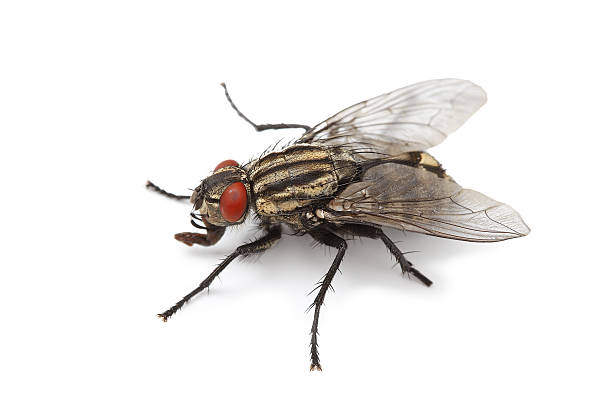
Bottle Flies
Also known as blow flies. The Green Bottle Fly is the most numerous type in the US, but they can also be blue. They are slightly larger than house flies at about 10 mm with a metallic blue or green body. They feed in the same environments as the house fly and the adults will eat a variety of garbage, vegetation, manure, and pollen. Their young eat exclusively carrion. Bottle flies will lay their eggs in dead carcasses, rotting meat, or open wounds. When the larvae hatch they feed on the meat. If the eggs hatch on a wounded animal the larvae will literally start to eat the animal alive. I have had the unfortunate experience of dealing with fly strike on one of my rabbits – I highly do not recommend. click here to read more about fly strike
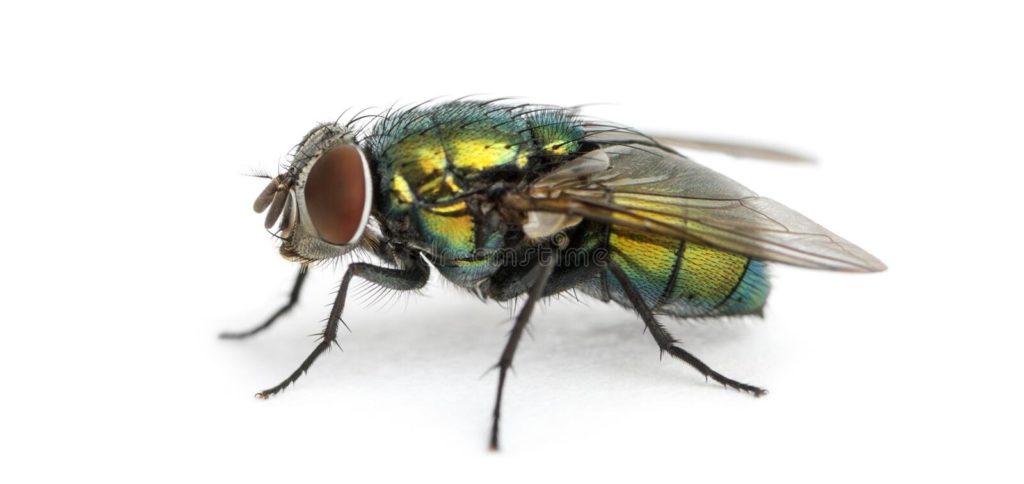
Barn Flies
Also called stable flies, biting flies, or dog flies. Barn flies are grey, about 7-8 mm long and are the worst late spring – early fall . These little buggers are super annoying. They feed on blood and will bite you & your animals, often on the legs. The bites not only hurt but can transfer disease and can cause anemia. Barn flies live for about a month and love moisture. They tend to hang out in moist bedding and spilled feed. While the adults don’t eat manure, they will lay their eggs in a manure pile.
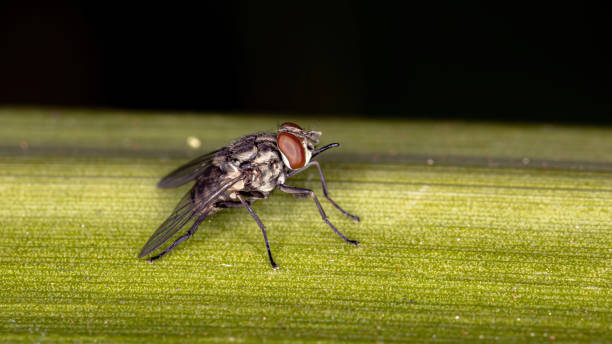
Horse Flies
Another biting fly, horse flies are larger (about 25 mm) when compared to Barn Flies, darker grey/brown with clear wings. Both males & females feed on nectar, the females also feed on blood. The females tend to feed on the back, neck, & sides of livestock. Horse flies tend to be more of an issue with large livestock like horse & cattle vs smaller livestock like chickens. They breed and lay eggs near water sources or in very moist bedding.
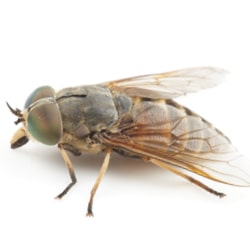
Preventing Flies on the Farm
Preventing the fly population from getting out of control is definitely easier than fighting an infestation. No matter if you have a couple flies or a couple thousand, you should always be doing the following.
Keep it Clean
Look at what most of the fly types have in common – and then do the opposite. Most flies love piles of manure, wet bedding, & wet feed. To discourage flies from hanging around your coop & barn be sure you are removing manure regularly. Compost your manure in either covered composting bins or in a managed pile away from the coop. Wet feed & bedding will not only attract flies it grows mold and can make your animals sick. I use a dropping board underneath my chicken roosts and daily collect the majority of the poop that happens in my coop. click here to read more about dropping boards. If you use the deep litter method in the your coop, be sure to pay attention to the litter conditions so it isn’t overly moist. click here to read more about deep litter
Keep it Dry
In addition to removing moist manure, bedding, & feed, you will want to work on eliminating muddy areas. Using sand in your run is a good way to help with drainage. Pay attention to the areas around water faucets and water buckets. Adding drainage stones around hoses or water spigots can prevent muddy areas. When birds are drinking they tend to splash and spill water in the area. Moving water buckets or waterers to different locations often can stop one location from getting muddy. If you keep ducks or geese, set up their pool on a pad of gravel, and provide a drainage path for the water run off when you dump the pool for cleaning.
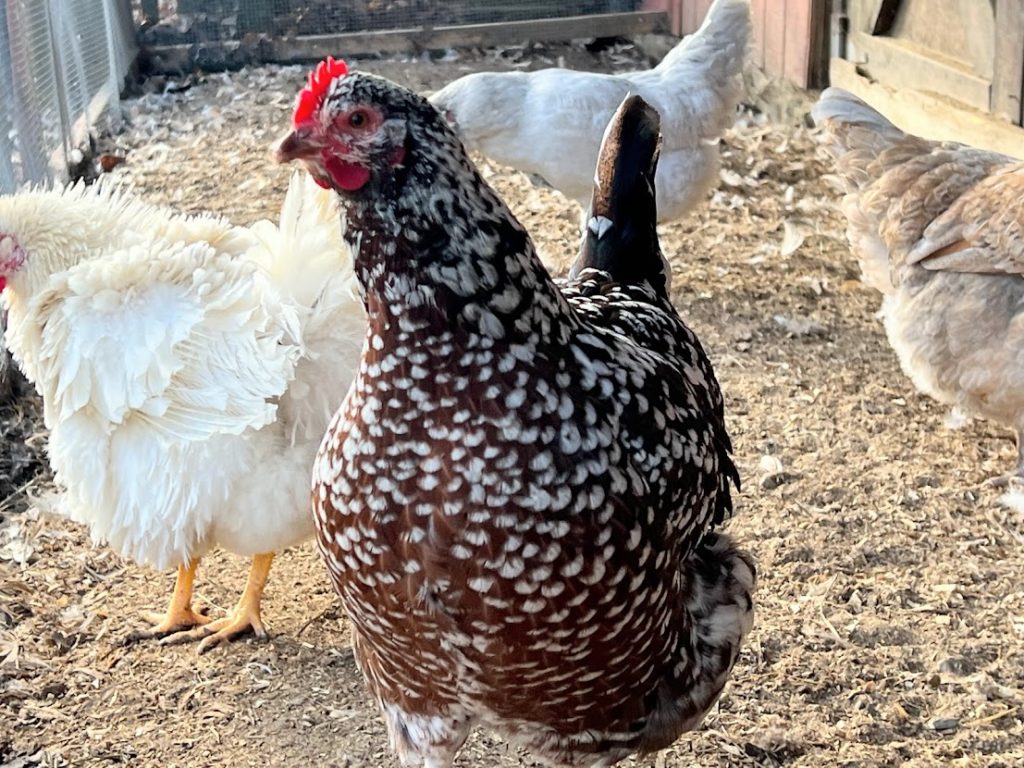
Make sure you have enough space for your animals
Having too many animals in too small of a space is a recipe for disaster on so many levels. High levels of manure, feed & water getting knocked around, mud from all the little feet walking, small wounds from fighting……all of these things can be caused by overcrowding and will attract flies.
Collect eggs often
The more eggs in a nest box, the more likely they will bump together and crack. Flies will love the exposed sticky, runny mess of raw egg. While in the box they will be walking all over the unbroken eggs transferring all manner of contaminate to the eggs.
Treat & cover wounds promptly
This is just good animal husbandry, but as soon as you notice a wound on any of your animals, clean it and bandage it the best you can. The smell of open wounds attract flies. At best they just land and transfer germs & bacteria to the wound. At worst they lay eggs in the wound and allow their babies to eat your animal alive. If at all possible, bring wounded animals inside until their wound has scabbed over to minimize the risk of fly strike. click here to read about assembling a chicken first aid kit
Run a fan during fly season
Many flies are not strong flyers. They like when the air is calm. If possible, add a barn fan inside your chicken coop or barn. Not only will this help keep things dry, the constant movement of air will disturb flies and discourage them from landing. Just be sure the fan is mounted up high where animals can not get injured by it.
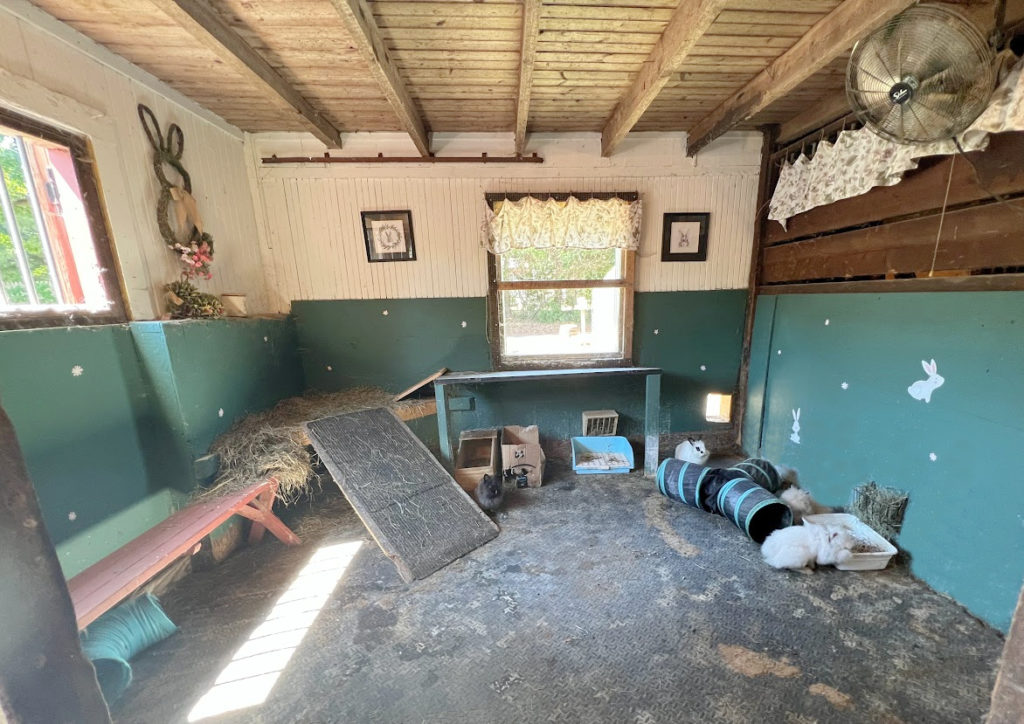
Employ fly predators
Fly Predators are insects that love to feed on fly larvae. I order them from Spaulding Labs. Every month during fly season they send me a small box with freshly hatching fly predators. I sprinkle them around my compost pile area and I have seen a huge reduction in fly activity since I started using them. I keep up my subscription as a preventative measure, but if you have a fly problem now, they will send you a double order the first few months to get it under control.
The only problem with this? Your chickens & ducks will definitely eat the fly predators. You have to use them in an area where flies would likely lay eggs but where your poultry won’t find them. My birds don’t have access to my compost bin. If they did I would recommend restricting access for at least a week after adding the fly predators to give them a chance to work. If you need to treat areas that the birds need access to, insecticides are a better option.
Elector PSP
If natural fly predators don’t work for your set up because the fly problem is directly in your chicken coop or run, poultry safe insecticides will work better. Elector PSP is a livestock safe insecticide that works to kill flies (and other pests like mites). It can be used both on your chickens directly (in the case of external parasites) and in the coop (in the case of insects living in the coop). Spray Elector PSP into all the cracks & crevices and fly breeding hotspots. It will work to control both house & stable flies and is effective in killing the adult & larval stages.
Don’t give your chickens more treats than they can quickly eat
If you give your chickens food scraps don’t put too much out at once. Whatever they don’t eat will just sit there rotting, inviting flies.
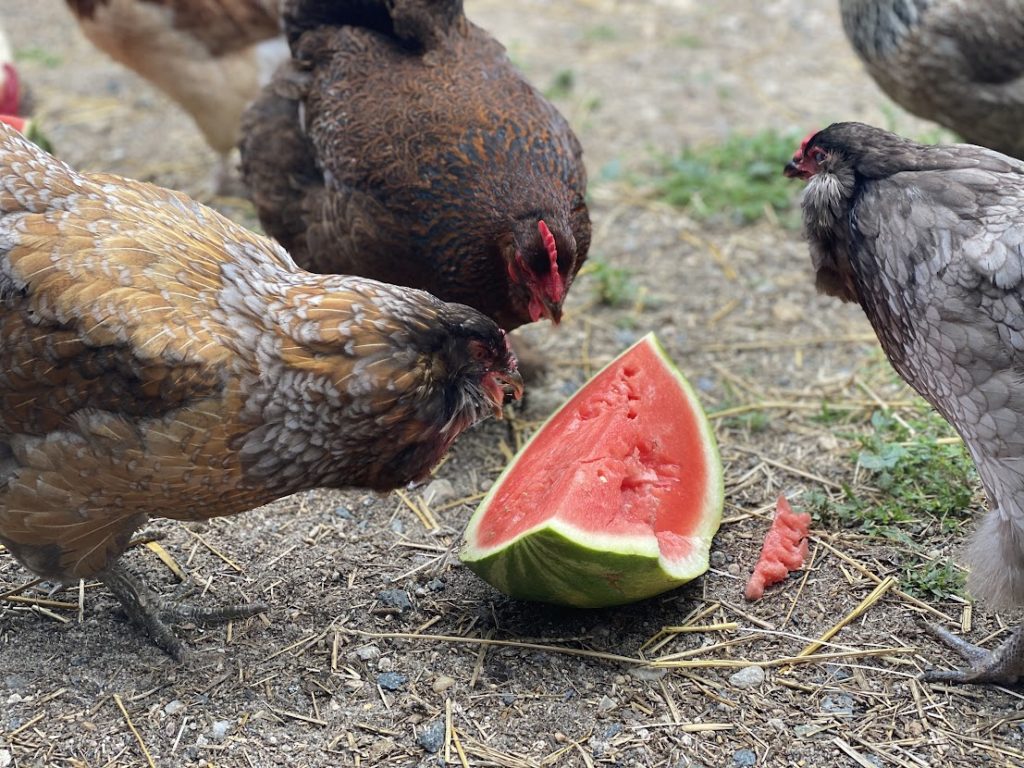
Properly manage your compost pile
Rotting manure, spent bedding, food scraps…your compost pile is fly paradise. Be sure you are properly managing your pile by turning it frequently. Turning the pile provides oxygen to the compost which hastens the decomposition process, which in turn gives off heat. Flies like warm compost, not hot compost. Increase the temperatures even more by draping the pile with a black tarp. click here to read more about composting
Use disposable fly traps around the run
Most inexpensive disposable traps work by having a smelly attractant inside a bag the flies can enter but can’t escape. They are very effective. I don’t like to hang the traps inside my coop because I don’t want to encourage random flies to come to the coop. Hang a few around the chicken run or yard, and be sure to check & change them as they get full. Keep them in areas your chickens can’t reach them. I would not recommend using the sticky fly strips unless you are absolutely sure your animals can’t reach them. If your birds accidently flapped into them you will have quite a problem!
Most of the liquid attractant bags are good for attracting house & bottle flies. The biting flies don’t tend to care about them. You will want to get some fly traps specifically designed for biting flies if you are fighting barn or horse flies.
Fly repelling plants
There is some evidence that the smell of certain herbs is repellant to flies. I have had mixed results with this, but at the very least they are pretty, smell nice to humans, and I’m never upset about adding more herbs to my yard! This works best if you plant the herbs around the coop/run/chicken yard perimeter. You can also try hanging bundles of drying herbs in the area. The best fly repelling herbs to try are basil, mint, lemongrass, rosemary, lavender, and bay leaf
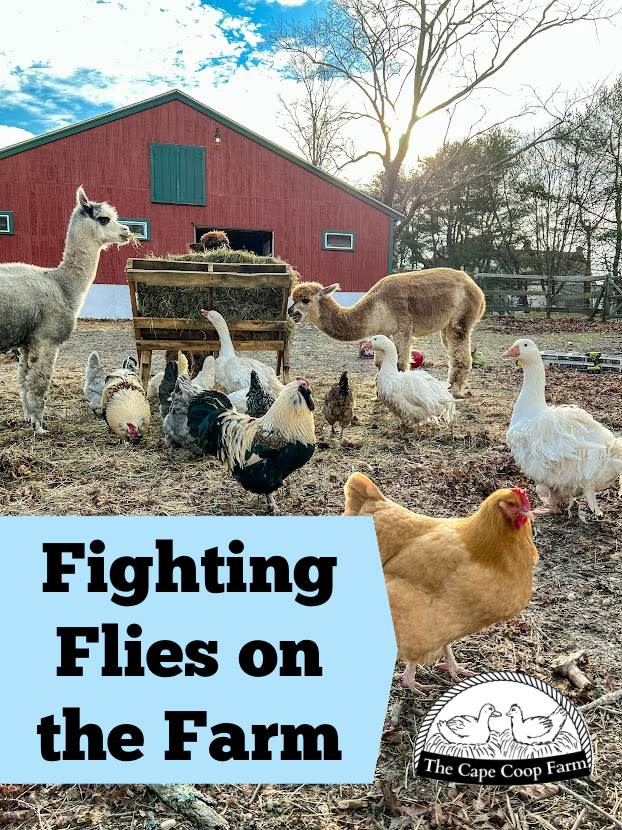
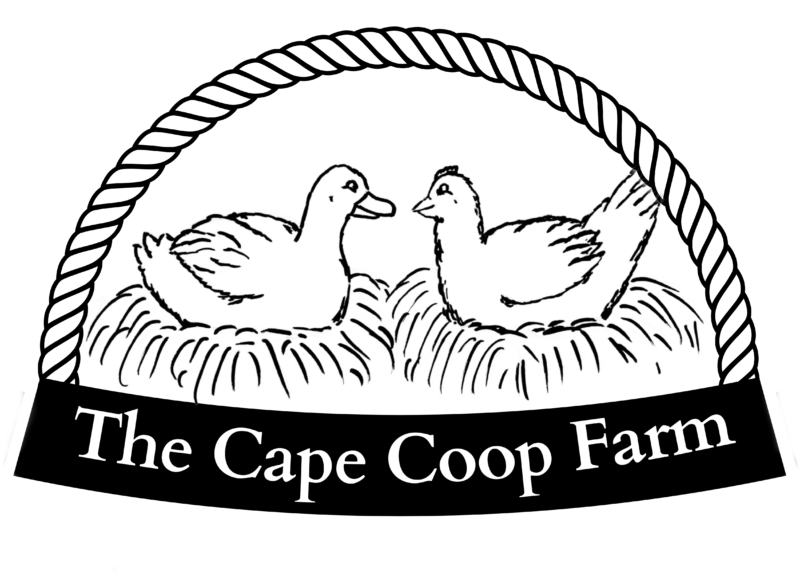
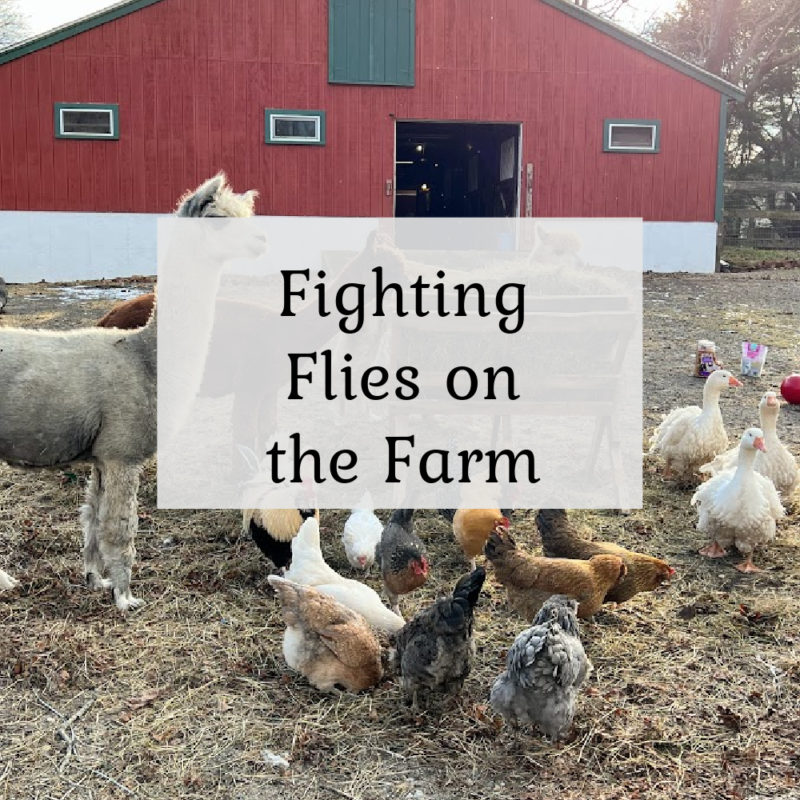

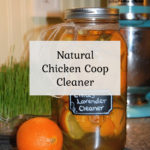
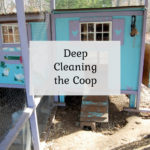
Kimberly McGinnis
Tuesday 24th of January 2023
Thank you! Have a great weekend!
Kimberly
Kimberly McGinnis
Monday 23rd of January 2023
Hi Liz, Thanks for the tips. Will most of these tips work on an outdoor bunny run? Last year was just horrible with flies and these teeny tiny flying black specks as well. I was out cleaning twice a day. This year I want to get a jump start on it. Anything different I should try for my 4 bunnies? At keeping flies and other pests away? Thanks again. Kimberly
Liz
Tuesday 24th of January 2023
Absolutely! For those tiny little pests I would try the sticky traps (just keep them where the bunnies can't get them). Bottle flies particularly are attracted to rabbit & sheep areas. I've had good luck trapping those by those thousands each season with the fly bags. Good luck!